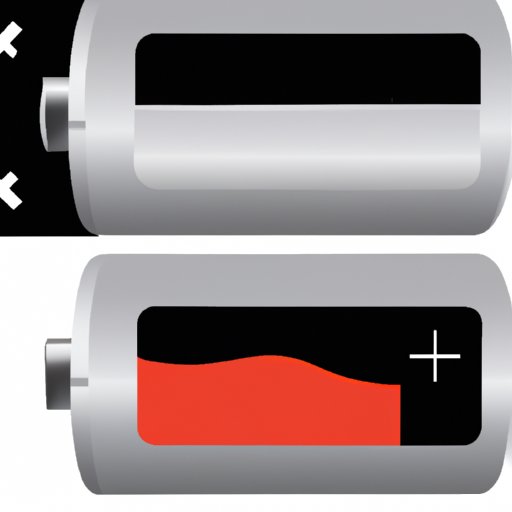Introduction
Battery health refers to the condition of a battery in terms of its performance and lifespan. It is important to maintain good battery health so that your device can continue to perform optimally and last longer. This article will explore what constitutes good battery health, and how you can maintain it.

Different Types of Battery Health and How to Maintain Them
There are several different types of batteries used in electronic devices, each with their own unique characteristics and requirements for maintenance. The three main types are lithium-ion batteries, lead-acid batteries, and nickel-metal hydride batteries.
Lithium-Ion Batteries
Lithium-ion batteries are the most common type of battery used in modern electronic devices. They are lightweight, have a high energy density, and are relatively inexpensive. To maintain good battery health, it is important to avoid overcharging and discharging the battery. According to Battery University, “The battery should not exceed 4.2V/cell when charged or be discharged below 2.5V/cell.” Additionally, it is important to avoid extreme temperatures, as this can damage the battery.
Lead-Acid Batteries
Lead-acid batteries are commonly used in cars, boats, and other vehicles. They are heavy and have a low energy density, but they are inexpensive and reliable. To maintain good battery health, it is important to keep the terminals clean and free from corrosion. Additionally, it is important to charge the battery regularly, as deep discharging can reduce its lifespan. According to Battery Council International, “Regular charging helps prevent sulfation, which is the leading cause of premature battery failure.”
Nickel-Metal Hydride Batteries
Nickel-metal hydride batteries are becoming increasingly popular in consumer electronics due to their high energy density and long lifespans. To maintain good battery health, it is important to avoid overcharging and discharging the battery. Additionally, it is important to avoid extreme temperatures, as this can damage the battery. According to Battery University, “Nickel-based batteries should not exceed 1.45V/cell when charged or be discharged below 0.9V/cell.”

Advantages of Good Battery Health
Maintaining good battery health has several advantages. For starters, it can improve the performance of your device. A healthy battery is able to hold a charge for longer periods of time and provide more power when needed. This can result in faster charging times and improved overall performance.
Additionally, maintaining good battery health can extend the lifespan of your device. A healthy battery is better able to withstand the rigors of everyday use and will last longer than an unhealthy battery. Finally, good battery health reduces the risk of damage or harm to the device. A healthy battery is less likely to overheat or suffer from other issues that can cause damage.

Impact of Poor Battery Health
Not maintaining good battery health can have a negative impact on your device. Poor battery health can result in reduced performance, shorter battery life, and increased risk of damage or harm to the device. A battery that is not properly maintained can become weak and unable to hold a charge for long periods of time. This can lead to slower charging times and reduced overall performance.
In addition, poor battery health can lead to a shorter battery life. An unhealthy battery is more likely to fail prematurely, leaving you with a device that needs to be replaced sooner than anticipated. Finally, poor battery health increases the risk of damage or harm to the device. An unhealthy battery is more prone to overheating and other issues that can cause serious damage.
Steps to Take for Improving Battery Health
If you want to improve the battery health of your device, there are a few steps you can take. First, it is important to keep the battery cool. Heat can accelerate the degradation of a battery, so it is important to avoid exposing it to high temperatures. Additionally, it is important to avoid extreme temperatures, both hot and cold. Exposing a battery to temperatures outside of its optimal range can damage it.
It is also important to use the right charger for your device. Using the wrong charger can cause damage to the battery. Finally, it is important to regularly check the battery health of your device. This will allow you to be aware of its current status and take proactive steps to improve its health.
Benefits of Regularly Checking Battery Health
Regularly checking your battery health has several benefits. First, it allows you to be aware of the current status of your battery. This will help you identify any potential problems before they become serious. Additionally, regularly checking your battery health gives you the opportunity to take proactive steps to improve its health. By taking the necessary steps to maintain good battery health, you can ensure that your device continues to perform optimally and last longer.
Tips for Maximizing Battery Life
In addition to maintaining good battery health, there are a few tips you can follow to maximize the life of your device’s battery. First, it is important to charge your device regularly but not too often. Overcharging can reduce the lifespan of your battery. Additionally, it is important to turn off features you don’t need, such as Bluetooth and Wi-Fi, to conserve battery power. Reducing the screen brightness can also help conserve battery power.
Finally, it is important to find out which apps are draining your battery. Some apps are more battery intensive than others, and knowing which ones are draining your battery can help you conserve power. You can do this by using the “Battery Usage” feature in your device’s settings menu.
Conclusion
In conclusion, it is important to maintain good battery health in order to get the most out of your device. Different types of batteries require different types of maintenance, and it is important to be aware of the specific requirements for each type. Good battery health can improve the performance of your device, extend its lifespan, and reduce the risk of damage or harm. Poor battery health can have the opposite effect. To improve your battery health, it is important to keep the battery cool, avoid extreme temperatures, use the right charger, and regularly check its health. Finally, there are several tips you can follow to maximize the life of your device’s battery, such as charging regularly but not too often, turning off features you don’t need, reducing screen brightness, and finding out which apps are draining your battery.
(Note: Is this article not meeting your expectations? Do you have knowledge or insights to share? Unlock new opportunities and expand your reach by joining our authors team. Click Registration to join us and share your expertise with our readers.)
